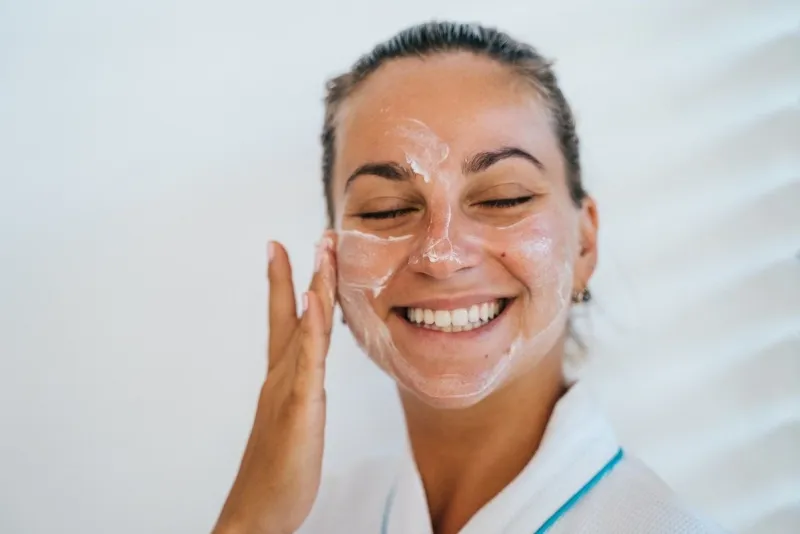How do sunscreens work?
There is, however, a way to stay safe: sunscreen. Sunscreen protects your skin from the sun’s harmful UV rays. It contains chemical or mineral sunscreen ingredients that can block UV or convert UV into heat.

The best offense is a good defense.
Shield your skin from sunburns with a personalized regimen that contains a high-quality day moisturizer with SPF.
What is chemical sunscreen?
Chemical sunscreen contains chemical ingredients or compounds, such as oxybenzone, avobenzone, octinoxate, octisalate, octocrylene, and homosalate. These compounds need to be absorbed by the skin, so that when the sun penetrates it, it absorbs the UV and then turns that UV into heat. In other words, it allows UV into the skin, and then converts it before it can cause changes on a cellular level.
What are the pros and cons of using chemical sunscreen?
Since chemical SPF is absorbed by the skin, it won’t leave behind any white cast. With that said, it’s well-suited for people with a darker skin tone that make the white cast of mineral sunscreen more apparent. Or if you simply don’t want to walk around with sunscreen smeared on your face, chemical sunscreen is for you.
It can worsen rosacea, a condition where the blood vessels on the face become inflamed. In addition, due to the dissipation of heat, it can aggravate melasma, a common skin condition that causes discolored patches to appear on the skin. That’s why if you have these conditions, it would be better to use a mineral-based sunscreen as it doesn’t contain chemicals that can cause irritation.
What is mineral sunscreen?
Compared to a chemical sunscreen that’s absorbed by the skin, mineral-based sunscreen merely sits on the skin. Also known as a physical sunscreen, it provides a physical barrier between your skin and the sun’s UV rays. It prevents UV from causing sunburns, sun spots, etc. by blocking it the moment it “attempts” to penetrate your skin. That’s why mineral sunscreens are also called “reflectors”.
As its name implies, mineral-based sunscreen contains minerals such as zinc oxide and titanium oxide.
What are the pros and cons of using mineral sunscreen?
Unlike chemical sunscreens that take about 20 minutes to be absorbed, mineral sunscreens can block UV rays away from your body immediately.
If you have sensitive skin, your best bet is mineral-based sunscreen. Mineral ingredients are more gentle — that’s why they’re the go-to sunscreen for babies.
So, is mineral sunscreen better? Not always. The downside is that mineral sunscreens can be messy and may be more likely to leave a white cast. Not only are they thick, but they’re more likely to rub off, thanks to sweat. For that reason, if you’re going swimming or if you know you’ll be sweating, don’t forget to reapply your sunscreen throughout the day. It won’t last as long on your skin.
And since it sits on your skin, it will create a chalky white residue. If you’re going for that “beach” look, great! But if you’d rather have an invisible filter of sun protection, choose chemical sunscreen.
Mineral vs chemical sunscreen: which one is better?
Any broad-spectrum protection sunscreen with a sun protection factor (SPF) will be able to protect your skin from the sun. When choosing between mineral vs. chemical sunscreen, you need to bear in mind that their main difference is in how they block UV. One blocks, the other absorbs. Ultimately, it’s up to you to decide how you want your sunscreen to work.
The main benefit of mineral-based sunscreen is that it’s less likely to irritate your skin. It can also sit on top of makeup, making it easier to apply and reapply. But because it may take longer to rub in, you may be more likely to have a white cast across your face.
Chemical sunscreen will absorb UV, but before the UV can cause damage to your body, it will dissipate into heat. Since it’s absorbed by your body, its advantage over mineral sunscreen is that it often rubs in easily, looking invisible. This, however, can cause or worsen skin conditions like rosacea, acne, etc.
Whether you go for the former or the latter, they will both get the job done. Just remember that for daily use, you may want to choose chemical sunscreen or a daily moisturizer with SPF. After all, you wouldn’t want to walk around the office with a white cast across your face, would you?
How should you apply sunscreen for optimal protection?
Even if you wear sunscreen, if your sunscreen habits aren’t the best, you won’t be able to provide your skin with the sun protection it deserves. Here’s how you can make the most out of your sunscreen:
- Choose a sunscreen that you want to wear. If you buy mineral-based sunscreen but you aren’t a fan of how it feels, you probably won’t end up wearing it. The best sunscreen is one that you want to wear.
- Top up on sun protection. Your sunscreen will eventually wear off, so you’ll have to top up on your sun protection. As a rule of thumb, be sure to reapply sunscreen every two hours.
- Put on sunscreen 30 minutes prior to sun exposure. Whether you’ve gone for chemical or non-chemical sunscreen, you need to give it time to “cling” to your skin. It’s a good practice to put sunscreen on at least 30 minutes prior to venturing out.
Looking for sun protection that suits your lifestyle?
At Proven Skincare, we know it seems like an impossible task to find a sunblock or skincare product that meets your skin needs to a T. What if you don’t want to walk around with a white cast of non-chemical sunscreen, but the chemicals in chemical sunscreen irritate your skin? Enter the Skincare Quiz.
When you take our Skin Quiz, we’ll use your answers to formulate custom products that contain all good ingredients. In that way, we can narrow down which skincare ingredients work for your skin and your lifestyle. Take the quiz today to find the product especially for you.











